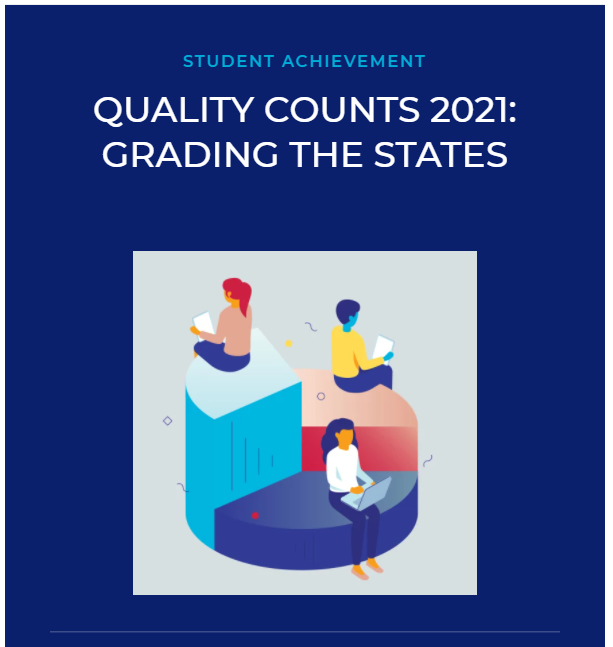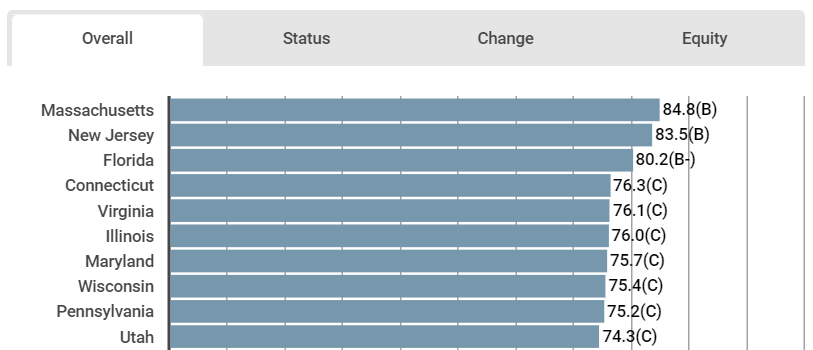 Florida, a national leader in education choice, ranks No. 3 in K-12 achievement for a second year in a row, trailing only Massachusetts and New Jersey, according to the latest rankings report from Education Week.
Florida, a national leader in education choice, ranks No. 3 in K-12 achievement for a second year in a row, trailing only Massachusetts and New Jersey, according to the latest rankings report from Education Week.
This shouldn’t be a surprise.
For one thing, Education Week based most of its 2021 rankings on the same achievement data it used last year, with updates only for graduation rates and Advanced Placement results.
For another, Florida has been killing it in the “K-12 Achievement” rankings for more than a decade.
Since 2009, Florida has ranked No. 7, No. 7, No. 6, No. 12, No. 12, No. 7, No. 7, No. 11, No. 11, No. 4, No. 4, No. 3 and No. 3.
Not a bad run, no?
I do feel like a broken record pointing this out. But as long as opponents of education choice continue to play their own broken record, it seems appropriate. (Remember, this year’s expansion of choice in Florida was “the death knell for public education.”)
It also seems appropriate to keep noting Florida continues to rock the Education Week rankings despite having:
Here are the top 10 states in terms of achievement according to this year's Quality Counts report, based on three measures, Status, Change and Equity, explained in detail in the report.

Florida's public education system ranks 29 of 50 in Education Week's latest state rankings.
It receives a grade of C, largely holding steady from last year.
For school finance, Florida gets a D+ and ranks 37th. Low per-student spending hurts its score in this category. In K-12 achievement, where data are generally updated every other year, it ranks 11th and gets a C, like last year.
A third broad category, chance for success, includes indicators from family wellbeing and preschool attendance to adult outcomes. Florida gets a C. It's helped by relatively high preschool enrollment, but harmed by factors like low household incomes. (more…)
Florida's status. Matt Reed, Florida Today's editorial page editor, takes a look at NAEP data and the most recent Education Week Quality Counts report and concludes: "We obviously have room to improve. But our system is neither starving, as educators always say. Nor is it “broken” or “failing,” as reformers keep telling us."
Florida's status, Part II. Diane Ravitch's latest take, after quoting a Florida teacher at length: "There is no Florida miracle. Education has only gotten worse over the past few years, no matter how schools, districts and the state itself game the system. And, contrary to what the media will tell you, it is NOT teachers’ fault, unions’ fault, and I won’t even blame it on the kids or their parents this time. It is the fault of education “reform” led by Jeb Bush et al."
Charter schools. The South Florida Sun Sentinel writes up the bill that would require school districts to share unused or underused facilities with charter schools. Bad idea, editorializes the Palm Beach Post.
Gays and lesbians. The Lake County School Board considers rules that would keep a Gay-Straight Alliance from forming at a middle school. Orlando Sentinel.
Teacher evaluations. Tampa Bay Times on one impact (or not) of the new system in Hillsborough: "After years of planning and training, observation and deliberation, the first wave of firings has begun under a teaching-improvement project funded by the Bill & Melinda Gates Foundation. The tally: Three teachers." (more…)
At the EdFly Blog today, former Orlando Sentinel columnist Mike Thomas asks a reasonable question: Why isn't the Florida teachers union trumpeting the dramatic gains of Florida teachers? This morning's Education Week ranking is just the latest in a long string of credible reports that finds Florida making steady academic progress. Shouldn't Florida teachers, doing more with less and under enormous pressure to produce results, get credit from those who portray themselves as their biggest supporters? Here's Thomas:
Florida scored another impressive victory with the state finishing sixth in the Education Week “Quality Counts’’ rankings.
This follows news from last month that Florida fourth graders finished second in the world on international reading assessments. In October, Miami-Dade won the prestigious Broad Prize for urban school districts because of progress in closing the achievement gap. Florida kids ranked second in the nation in learning gains dating back to the 1990s. I could go on.
Alas, Florida’s good news is not celebrated by all, even by its own teachers’ union. The Florida Education Association has been silent on all of the above, even though its teachers are on the front lines of these successes. Repentant reformer Diane Ravitch actually compared student achievement in Florida and Massachusetts. Of course Massachusetts kids perform better. Look at the student demographic and income data, Diane. Are you serious?
The reason for this denial is that Florida did not achieve its success by acceptable means. By that, I mean if the state had achieved these results by tripling education spending and eliminating its accountability provisions and school choice options, the above victories would have been trumpeted from the rooftops by the FEA and Diane as well.
Continue reading Thomas' post here.
Editor’s note: Today, we introduce a new feature (even if we’re not sure the name will last) - an occasional compilation of bite-sized nuggets about school choice and education reform that are worth noting but may not be worth a post by themselves.
More anti-Muslim bigotry in school choice debates
It’s nearly impossible to go a month without hearing another example of anti-Muslim bigotry in a school choice debate.
The latest example: Louisiana state Rep. Valarie Hodges, who now says she wishes she had not voted for Gov. Bobby Jindal’s voucher bill because she fears it will promote Islam. “There are a thousand Muslim schools that have sprung up recently,” she said. “I do not support using public funds for teaching Islam anywhere here in Louisiana.”
The lawmaker’s comments echo Muslim bashing in school choice debates in Kansas, Alabama, Tennessee and other places in the past few months alone. Sadly, religious bigotry has long been a part of the school choice narrative. To repeat what we wrote in April:
The courts have ruled that vouchers and tax credit scholarships are constitutional. We live in a religiously diverse society and this pluralism is a source of pride and strength. We can’t pick and choose which religions are acceptable and unacceptable for school choice. And we should not tarnish whole groups of people because of the horrible actions of a few individuals. In the end, expanded school choice will serve the public good. It will increase the likelihood that more kids, whatever their religion, become the productive citizens we all want them to be.
Jeb Bush endorses pro-choice school board candidate
Jeb Bush doesn’t endorse local candidates often. But last week, he decided to back a Tampa Bay-area school board member who openly supports expanded school choice, including vouchers and tax credit scholarships.
Glen Gilzean, 30, is running against four other candidates to keep the Pinellas County School Board seat that Gov. Rick Scott appointed him to in January. The district in play includes much of the city of St. Petersburg and has more black voters than any other.
I don’t know how much Bush’s endorsement will help Gilzean. He's a black Republican in a district that leans Democratic (even if school board races in Florida are officially nonpartisan). But I do know this: Black students in Pinellas struggle more than black students in every major urban school district in Florida, and frustrated black residents are increasingly open to school choice alternatives. (more…)